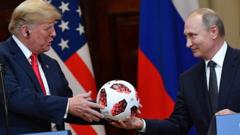Why Did Narinder Kaur Slam the BBC for Casting Thomas Skinner on Strictly?

Controversy Surrounds BBC Strictly Come Dancing Line-up: A Closer Look
The recent announcement of participants for BBC's popular dance competition, Strictly Come Dancing, has stirred significant debate. As viewers eagerly anticipate the new season, comments from public figures have sparked discussions about diversity, representation, and the perceived bias within the entertainment industry. The conversation took a notable turn when Jeremy Vine panellist and former Big Brother star, Narinder Kaur, voiced her concerns about the selection process, leading to an exchange with fellow contestant Thomas Skinner. This article delves into the themes of representation, controversy, and the complexities of public opinion surrounding the show.
The Statement That Sparked Outrage
In a video shared on X, Narinder Kaur claimed she was deemed "too controversial" for the show, suggesting that the BBC favors a certain demographic that fits a specific mold. Her comments highlight an ongoing debate about the representation of people of color and the biases that may exist in media hiring practices. Kaur's assertion indicates a feeling of exclusion among those who do not conform to traditional expectations, particularly in a platform as public as Strictly Come Dancing.
Controversial Figures and Media Perception
Adding fuel to the fire, Kaur pointed out the difference in treatment between controversial figures based on race and gender. She expressed her disbelief at the inclusion of Thomas Skinner, a white male, in the line-up, contrasting it with her own experiences. Kaur voiced her concern that individuals with right-wing opinions are often celebrated, while others may face cancellation. This conversation underscores the complexities surrounding media representation and the varying thresholds for what is deemed acceptable discourse.
Thomas Skinner's Response
In response to Kaur's remarks, Skinner acknowledged her right to voice her opinions, emphasizing his intent to unite rather than divide. He expressed regret if his past actions or statements had upset anyone, reiterating that his goal is to promote positivity. Skinner’s comments reflect a broader theme of reconciliation and the desire for constructive dialogue in the face of criticism.
The Role of Social Media in Shaping Public Opinion
Skinner also addressed the backlash he received on social media, revealing that he found it challenging to ignore the negativity directed at him. His experience highlights the impact of social media on personal branding and public perception, particularly for individuals in the entertainment industry. The ease of communication on these platforms can lead to a rapid spread of opinions—both supportive and critical—which can significantly affect a public figure's career.
Political Views and Media Scrutiny
The discussions surrounding Skinner extend beyond his participation in Strictly. His political views, including his support for Donald Trump and comments regarding national pride, have ignited further debate. Many argue that public figures should be held accountable for their opinions, while others defend their right to express differing viewpoints without facing backlash. This dichotomy raises questions about the role of media in shaping narratives around personality and political alignment.
The Importance of Representation in Entertainment
The ongoing conversation about representation in entertainment highlights a critical issue: the need for diverse voices in media. Kaur's comments resonate with many who feel underrepresented in mainstream narratives, prompting a call for greater inclusivity. The entertainment industry plays a pivotal role in shaping societal perceptions; thus, diverse representation is crucial for fostering understanding and acceptance among varied demographic groups.
Understanding the Audience's Perspective
The audience's reaction to the Strictly Come Dancing line-up reveals much about societal attitudes towards race, gender, and political beliefs. Many viewers are vocal about their expectations for inclusivity and fairness in casting decisions. Audiences today are more engaged and aware of the implications of media representation, leading to a demand for accountability from network executives and producers.
Is Controversy Necessary for Ratings?
This situation raises an intriguing question: is controversy essential for maintaining viewer interest? In an era where sensationalism often drives engagement, media outlets may feel compelled to feature controversial figures to attract attention. However, this practice can lead to ethical dilemmas regarding the portrayal of individuals and the messages broadcasted to audiences. Striking a balance between entertainment and responsible representation remains a challenge for producers.
Future Implications for Strictly Come Dancing
As Strictly Come Dancing prepares for its upcoming season, the discussions surrounding the show's casting choices will likely continue to evolve. The conversations prompted by Kaur and Skinner’s exchange may influence how producers approach diversity and the selection of participants in future seasons. With heightened awareness of representation issues, audiences are increasingly scrutinizing the decisions made by networks.
Conclusion: The Path Forward
The debates surrounding the BBC's Strictly Come Dancing line-up illustrate the broader societal conversations about race, representation, and the complexities of public discourse. As we move forward, it is crucial for both media and audiences to engage in open, constructive dialogues about these themes. The future of entertainment hinges on our ability to embrace diversity and foster an environment where all voices can be heard. How will the changes in representation within media impact the next generation of public figures and audiences?
Frequently Asked Questions
What are the main criticisms surrounding the BBC's Strictly Come Dancing casting choices?
The primary criticisms include concerns about diversity, representation of marginalized groups, and perceived biases favoring certain demographics over others.
How does social media impact public figures like Thomas Skinner?
Social media can amplify both support and criticism for public figures, affecting their reputations and careers. It also facilitates direct engagement with audiences.
What do viewers expect from media representation in entertainment?
Viewers increasingly expect diverse and inclusive representation in entertainment, advocating for fair treatment of all demographics and a variety of voices in storytelling.
How can controversy affect a show's ratings?
Controversy can drive viewer interest, leading to higher ratings. However, it can also result in backlash and negative perceptions, making it a double-edged sword for producers.
What steps can producers take to improve diversity in casting?
Producers can implement more inclusive hiring practices, actively seek out diverse talent, and ensure their casting decisions reflect the demographics of their audience.
As we reflect on the evolving landscape of media representation, what role do you think audiences should play in shaping the future of entertainment? #RepresentationMatters #MediaDebate #DiversityInMedia
```Published: 2025-08-14 20:48:11 | Category: Entertainment



